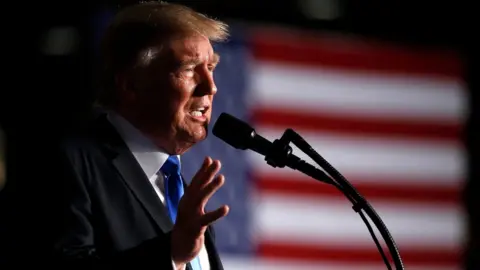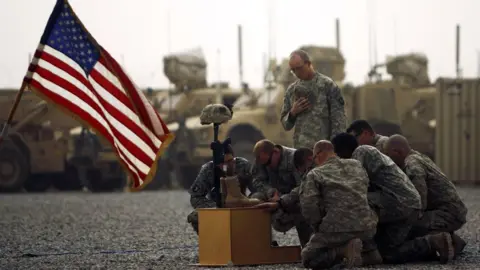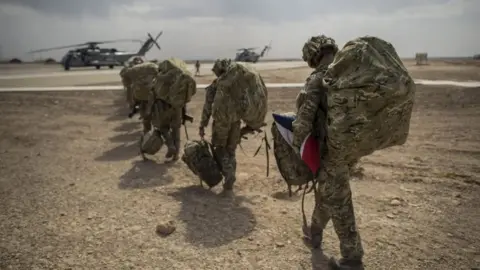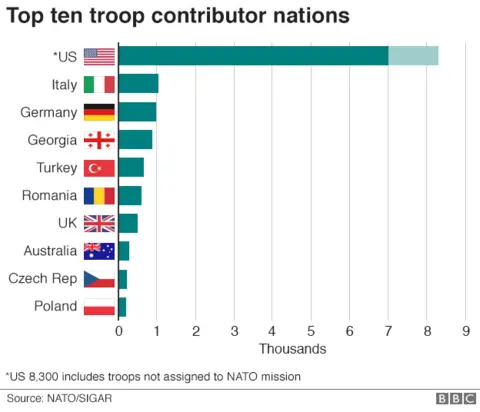Trump rhetoric versus Afghan reality
 Reuters
ReutersAfter some 16 years, the battle for Afghanistan - America's longest running war - is going to get a whole lot longer.
This was the essential message from President Donald Trump's address. His stress on abandoning timetables and moving to a "conditions-based approach" as he called it, means that US troops will be in Afghanistan for a considerable time to come.
The decision on a new Afghan strategy was much delayed, but after much prevarication he has essentially followed the line of his senior military advisers.
He refused to give any numbers as to additional troops and so on, but the plan backed by his generals is thought to involve the despatch of some 3,800 additional military trainers and advisers to the country - so it is likely that this is part of what will happen.
US air support - crucial in helping Afghan government forces to withstand Taliban pressure on the battlefield - may also be stepped up, but here too President Trump was playing his cards close to his chest.
In rejecting some of the less conventional policy options like a total US withdrawal from Afghanistan, or the turning over of the mission lock, stock and barrel to a private contractor, President Trump has effectively taken ownership of America's longest running war.
Mr Trump admitted that his instinct was to withdraw US forces from Afghanistan altogether. But having grappled with the self-same problems as his predecessor Barack Obama he has come up with a broadly similar answer - more training and assistance for the Afghan forces to help them resist Taliban advances.
 AFP
AFPOf course Mr Trump inevitably tried to present this policy as a new departure. A conditions-based strategy means the US is involved for the long haul.
Things are not going well for government forces. The Taliban hold almost half of the country and the Afghan military's performance - other than its elite special forces - is patchy at best. So there is a lot to do just to stabilise the situation before even thinking about the Afghan government forces going back onto the offensive.
It was all wrapped up in typical Trump rhetoric - the talk of "victory", the insistence that the war in Afghanistan was not about nation-building but about "killing terrorists" as he put it. This was no doubt an effort to reassure his political base who are as sceptical about foreign military adventures as Mr Trump has always been.
Mr Trump proposed an integrated approach - military, political and diplomatic. He had tough words for Pakistan who he said "had much to lose by continuing to harbour terrorists. That will change and change immediately," he asserted.
But just how much pressure is he able to exert on Islamabad? Some US security assistance funds have already been suspended. But Pakistan - half-ally, half-problem for Washington - is also the prime intermediary with the Taliban - a group at least parts of which, Mr Trump hoped one day, possibly, to bring to the negotiating table.
Mr Trump's stress on building up the US-Indian relationship and on what India might offer Afghanistan in terms of economic development was at least a stab at a wider regional approach - but one also intended to ring alarm bells in Pakistan.
There were tough words too for the Afghan authorities. Riven by factionalism and corruption, the Afghan government is no poster-child for democratic values. Mr Trump said that he wasn't going to dictate how the Afghans should rule themselves. But in almost the same breath he said Washington was not offering the Kabul government a blank cheque. "Our support is not unlimited," he said. "Americans expect," he said, "real reforms, real progress and real results."
Rare praise to Nato
President Trump's decision has implications for a number of other countries, not least Washington's Nato allies. The call already went out to Nato capitals before the summer for them to increase their contributions to the US-led force.
Britain, which already has some 500 troops in Afghanistan - mainly in and around Kabul - has already agreed to despatch a further 85 personnel. Like the other international forces and the bulk of the US troops they are not engaged in combat but in supporting, training and mentoring the fledgling Afghan forces.
 PA
PAUK Defence Secretary Sir Michael Fallon welcomed the Trump announcement noting "we have to stay the course in Afghanistan to help build up its fragile democracy".
Nato Secretary General Jens Stoltenberg similarly welcomed the Trump speech noting that the alliance currently has over 12,000 troops in the country and that over recent weeks some 15 allies have pledged additional contributions.

In his address President Trump - a longstanding critic of Nato - had some rare words of praise for the alliance noting that "we told them to contribute more and they have done so".
So these then are the broad lines of the Trump vision for an Afghan policy. The details? Well, they will become apparent later. It is the moment when the Trump rhetoric came up against the Afghan reality, and the Afghan reality has probably won.
Afghanistan has now become Mr Trump's war. He faced the same set of bad options faced by his predecessors. And whatever the rhetoric he seems to have set a broadly similar course, except that he insists he will be tougher and that he will get results.